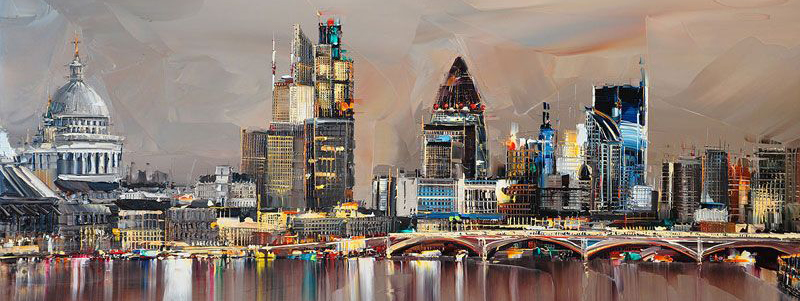The number of poets born or to have lived in London who also dedicated their verses to it is not belittled by the number of writers to have done so. We shall mention just a few.
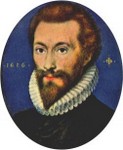 John Donne was born in 1572, into a catholic family. In those years, the practice of such religion was illegal. Donne was nominated Dean of St Paul's Cathedral by the King, after having abandoned the catholic religion, and as a poet and essayist, he focused intensely on English society, criticising many behavioural aspects of it, such as the corruption of the legal system.
John Donne was born in 1572, into a catholic family. In those years, the practice of such religion was illegal. Donne was nominated Dean of St Paul's Cathedral by the King, after having abandoned the catholic religion, and as a poet and essayist, he focused intensely on English society, criticising many behavioural aspects of it, such as the corruption of the legal system. 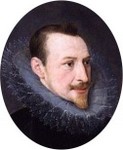 The poet Edmund Spenser was born in 1552 in East Smithfield and attended the Merchant Taylor School before moving on to Cambridge. During the writing of his poem The Faerie Queen and the Amoretti sonnets, Spenser drew inspiration from Petrarca's Canzoniere, which he admired greatly.
The poet Edmund Spenser was born in 1552 in East Smithfield and attended the Merchant Taylor School before moving on to Cambridge. During the writing of his poem The Faerie Queen and the Amoretti sonnets, Spenser drew inspiration from Petrarca's Canzoniere, which he admired greatly. Robert Herrick was born in 1591 in a house in Cheapside, the City street near the Bank of England and St Paul's Cathedral. In his verses, he evoked his childhood: "Golden Cheapside where the earth of Julia Herrick gave to me my birth..."
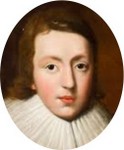 John Milton was born in Bread Street on December 9th, 1608, in a house which today bears a blue ceramic plaque with a bright frame. As an adult, he moved to live in Hammersmith, at the time a semi-rural village.
John Milton was born in Bread Street on December 9th, 1608, in a house which today bears a blue ceramic plaque with a bright frame. As an adult, he moved to live in Hammersmith, at the time a semi-rural village. Alexander Pope was born in 1688 in Lombard Street, in a house which stood amid the buildings of the banks. He was the son of catholic parents, and at the time Catholics were persecuted and banned from social life. They could not vote, attend university, nor teach or stand for any form of public office, with the penalty of jail if they did in fact do so. 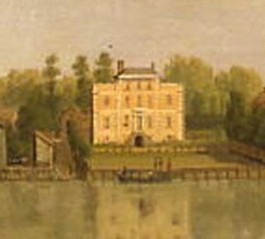 After sending him to an illegal catholic school for some years, his parents decided to leave London in order to escape the anti-catholic sentiments.
After sending him to an illegal catholic school for some years, his parents decided to leave London in order to escape the anti-catholic sentiments.  They moved to a small town in Berkshire, and Pope took care of his own education by reading the classics, such as Horace, Juvenal, Homer, Virgil, as well as Chaucer, Shakespeare and Dryden. Pope even became a translator of Homer, and with the money made from this occupation, he bought a villa in Twickenham, on the Thames. He had a grotto built in his garden, and in order to obtain a strong refraction of the light entering, he decorated with pieces of alabaster, marble, mirrors, stalactites, Iceland spars, crystals, ammonites, and Cornish diamonds given to him by a friend.
They moved to a small town in Berkshire, and Pope took care of his own education by reading the classics, such as Horace, Juvenal, Homer, Virgil, as well as Chaucer, Shakespeare and Dryden. Pope even became a translator of Homer, and with the money made from this occupation, he bought a villa in Twickenham, on the Thames. He had a grotto built in his garden, and in order to obtain a strong refraction of the light entering, he decorated with pieces of alabaster, marble, mirrors, stalactites, Iceland spars, crystals, ammonites, and Cornish diamonds given to him by a friend.
 They moved to a small town in Berkshire, and Pope took care of his own education by reading the classics, such as Horace, Juvenal, Homer, Virgil, as well as Chaucer, Shakespeare and Dryden. Pope even became a translator of Homer, and with the money made from this occupation, he bought a villa in Twickenham, on the Thames. He had a grotto built in his garden, and in order to obtain a strong refraction of the light entering, he decorated with pieces of alabaster, marble, mirrors, stalactites, Iceland spars, crystals, ammonites, and Cornish diamonds given to him by a friend.
They moved to a small town in Berkshire, and Pope took care of his own education by reading the classics, such as Horace, Juvenal, Homer, Virgil, as well as Chaucer, Shakespeare and Dryden. Pope even became a translator of Homer, and with the money made from this occupation, he bought a villa in Twickenham, on the Thames. He had a grotto built in his garden, and in order to obtain a strong refraction of the light entering, he decorated with pieces of alabaster, marble, mirrors, stalactites, Iceland spars, crystals, ammonites, and Cornish diamonds given to him by a friend.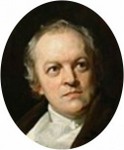
William Blake was born in 1757 at 28, Broad Street, which is now called Broadwick Street, near Golden Square. Today the house bears his name. His poetry and his paintings have such a complex and original symbolism that they induced contemporary readers to consider him completely mad.
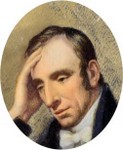 William Wordsworth born in Cumberland in 1770; he immortalized the wildlife and nature of the Lake District with his poetry, but also described early nineteenth-century London. The poem written above Westminster Bridge in 1802 begins with the famous verse: "Earth has not anything to show more fair...". Wordsworth described the city as a pastoral place, although in certain moments noise and confusion prevail and the idyllic atmosphere vanishes.
William Wordsworth born in Cumberland in 1770; he immortalized the wildlife and nature of the Lake District with his poetry, but also described early nineteenth-century London. The poem written above Westminster Bridge in 1802 begins with the famous verse: "Earth has not anything to show more fair...". Wordsworth described the city as a pastoral place, although in certain moments noise and confusion prevail and the idyllic atmosphere vanishes.  The essayist and poet Charles Lamb, who would write under the pseudonym of Elia, was born in Inner Temple in 1775 and lived at 122, Great Portland Street. In his most famous work, Tales from Shakespeare, Lamb maintains, amongst other things, that the Bard should be read rather than acted out, as only in such a way can one fully appreciate his genius. In a brief essay, written in the form of a short open letter to Leigh Hunt, going by the title The Londoner, he mocks his fellow citizens' attraction for the countryside and nature, passing it off as a temporary fad.
The essayist and poet Charles Lamb, who would write under the pseudonym of Elia, was born in Inner Temple in 1775 and lived at 122, Great Portland Street. In his most famous work, Tales from Shakespeare, Lamb maintains, amongst other things, that the Bard should be read rather than acted out, as only in such a way can one fully appreciate his genius. In a brief essay, written in the form of a short open letter to Leigh Hunt, going by the title The Londoner, he mocks his fellow citizens' attraction for the countryside and nature, passing it off as a temporary fad. 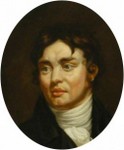 His friend, Samuel Coleridge, a poet and philosopher, founder of the romantic movement, lived at 71, Berner Street. It was in this house that, amongst other works, he wrote The Rime of the Ancient Mariner, the lyrics of which were later to be a source for many different metaphors used in the English language. The most quoted is that of the albatross around one's neck, meaning that an act committed keeps causing one problems or hinders one's success. The phrase refers to the legend about the mariner who had killed an albatross which had been following the ship, and who was then forced to wear the albatross around his neck by his companions, who considered the killing to be an ill-fated act and an omen of doom.
His friend, Samuel Coleridge, a poet and philosopher, founder of the romantic movement, lived at 71, Berner Street. It was in this house that, amongst other works, he wrote The Rime of the Ancient Mariner, the lyrics of which were later to be a source for many different metaphors used in the English language. The most quoted is that of the albatross around one's neck, meaning that an act committed keeps causing one problems or hinders one's success. The phrase refers to the legend about the mariner who had killed an albatross which had been following the ship, and who was then forced to wear the albatross around his neck by his companions, who considered the killing to be an ill-fated act and an omen of doom.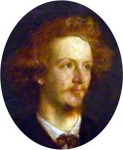 The poet Algernon Swinburne, born on April 5th, 1837, at 7, Chester Street, was, amongst other works, the author of a series of rondeau poems, and lived for a few years (before deciding that his flatmate's lifestyle was too extravagant for him) with Dante
The poet Algernon Swinburne, born on April 5th, 1837, at 7, Chester Street, was, amongst other works, the author of a series of rondeau poems, and lived for a few years (before deciding that his flatmate's lifestyle was too extravagant for him) with Dante 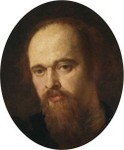 Gabriel Rossetti, at 16, Cheyne Walk. Rossetti kept various exotic animals in the garden, such as a zebu with fearsome horns and its fatty hump, which he kept tied to a tree.
Gabriel Rossetti, at 16, Cheyne Walk. Rossetti kept various exotic animals in the garden, such as a zebu with fearsome horns and its fatty hump, which he kept tied to a tree. 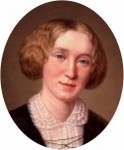 George Eliot, a pseudonym belonging to Mary Anne Evans, was born in 1819 in Arbury and later went to live in London in 1849, after her father's death. Because of her relationship with George Lewes, who was married, Evans was considered an adulterous sinner. In 1861, at a dinner held in her honour at the Greenwich Observatory, she found herself being the only woman present. The event was held to celebrate the publishing of her novel Silas Marner, however Victorian morality did not allow for ladies of good family to speak to her, or even sit at the same table. In London, Evans lived at 4, Cheyne Walk, in a house that is the most beautiful and also the largest of the whole row.
George Eliot, a pseudonym belonging to Mary Anne Evans, was born in 1819 in Arbury and later went to live in London in 1849, after her father's death. Because of her relationship with George Lewes, who was married, Evans was considered an adulterous sinner. In 1861, at a dinner held in her honour at the Greenwich Observatory, she found herself being the only woman present. The event was held to celebrate the publishing of her novel Silas Marner, however Victorian morality did not allow for ladies of good family to speak to her, or even sit at the same table. In London, Evans lived at 4, Cheyne Walk, in a house that is the most beautiful and also the largest of the whole row. At 24, Cheyne Row, a parallel street to the north of Cheyne Walk, lived Thomas Carlyle from 1834 to 1881. In 1895, Carlyle's house was transformed into a museum conserving the taste of a Victorian household and the atmosphere of the period during which the writer and his wife lived there.
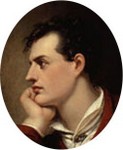 George Byron is one of the great Romantic poets. He was born in 1788 in Holles Street, near the aristocratic Cavendish Square. The first edition of his travel journal written in verses, Childe Harold's Pilgrimage, was sold out within three days. Another very famous poem of his is Don Juan.
George Byron is one of the great Romantic poets. He was born in 1788 in Holles Street, near the aristocratic Cavendish Square. The first edition of his travel journal written in verses, Childe Harold's Pilgrimage, was sold out within three days. Another very famous poem of his is Don Juan.  John Keats was born in 1795 in an inn, as he himself never failed to mention, where his father worked as a groom in the stables. The inn went by the name of the Swan and Hoop; nowadays it is a pub known as Keats at the Globe, in Moorgate. Keats had been baptised in the church of St Botolph. As a student he had lived in Well Walk with his brother, who had died at a young age of tuberculosis. He then moved to Wentworth Place in Hampstead, where he met Fanny Brawne. Beneath the plum tree in the garden, he wrote Ode to a Nightingale, which starts with the famous words:
John Keats was born in 1795 in an inn, as he himself never failed to mention, where his father worked as a groom in the stables. The inn went by the name of the Swan and Hoop; nowadays it is a pub known as Keats at the Globe, in Moorgate. Keats had been baptised in the church of St Botolph. As a student he had lived in Well Walk with his brother, who had died at a young age of tuberculosis. He then moved to Wentworth Place in Hampstead, where he met Fanny Brawne. Beneath the plum tree in the garden, he wrote Ode to a Nightingale, which starts with the famous words: "My heart aches, and a drowsy numbness pains
My sense, as though of hemlock I had drunk,
Or emptied some dull opiate to the drains..."
The poet was also hit by tuberculosis and left for Rome in order to seek health care, however he died at the age of twenty-six. In 1925, Keats' home and that of the Brawne family were joined and transformed into a museum.
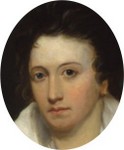 Percy Bysshe Shelley was the third of the Romantic poets. He was born in 1792 at Field Place, Sussex, and was a proud detractor of London. "Hell is a city much like London, a populous and smoky city" he wrote in Peter Bell III. Amongst the flaws of the capital, he even included the fact of the streets having cobblestones which were not apt for the erection of barricades. Another of his poems, Men of England, is an exhortation containing Marxist content. After posing a rhetoric question to labourers: "Why do you waste such effort only to grant your masters greater profits?", the poet accuses them of being too cowardly for rebellion. Shelley was a vegetarian, and in one of his essays in defence of a meatless diet, he condemns the injustice and barbarity carried out by man against the poor victims, forced to lead a short unhappy life of slavery.
Percy Bysshe Shelley was the third of the Romantic poets. He was born in 1792 at Field Place, Sussex, and was a proud detractor of London. "Hell is a city much like London, a populous and smoky city" he wrote in Peter Bell III. Amongst the flaws of the capital, he even included the fact of the streets having cobblestones which were not apt for the erection of barricades. Another of his poems, Men of England, is an exhortation containing Marxist content. After posing a rhetoric question to labourers: "Why do you waste such effort only to grant your masters greater profits?", the poet accuses them of being too cowardly for rebellion. Shelley was a vegetarian, and in one of his essays in defence of a meatless diet, he condemns the injustice and barbarity carried out by man against the poor victims, forced to lead a short unhappy life of slavery. 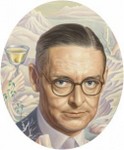 One of the greatest English poets, T.S. Eliot, arrived in London from the United States in September 1914, and had started working in a town which he defined The Waste Land: unreal, foreign, yet hospitable, tolerant, and which did not demand to be understood as in the case of Paris.
One of the greatest English poets, T.S. Eliot, arrived in London from the United States in September 1914, and had started working in a town which he defined The Waste Land: unreal, foreign, yet hospitable, tolerant, and which did not demand to be understood as in the case of Paris.  On the contrary, Dylan Thomas, whilst having many friends in the capital, with whom he would entertain unending
On the contrary, Dylan Thomas, whilst having many friends in the capital, with whom he would entertain unending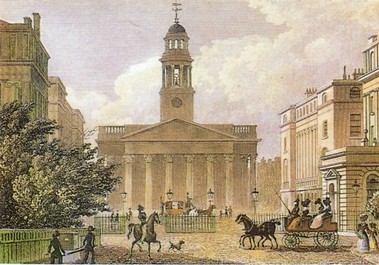 conversations, described London as a threatening place, albeit with a surreal, obscure, and visionary style to it. He had also met his wife-to-be there, Caitlin Macnamara, in the Weathsheaf pub in the Fitzrovia area.
conversations, described London as a threatening place, albeit with a surreal, obscure, and visionary style to it. He had also met his wife-to-be there, Caitlin Macnamara, in the Weathsheaf pub in the Fitzrovia area. 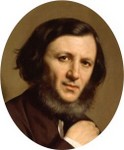 The poet Robert Browning was born on May 7th, 1812 in the suburbs of Camberwell. His grandfather had made money through slave trade, whereas his father had been an abolitionist. Along with his wife, the poet Elizabeth Barrett,
The poet Robert Browning was born on May 7th, 1812 in the suburbs of Camberwell. His grandfather had made money through slave trade, whereas his father had been an abolitionist. Along with his wife, the poet Elizabeth Barrett, 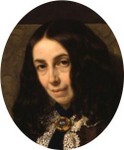 Browning came to live in Italy, at first in Pisa, and then later in Florence, where she died, and lastly in Asolo. He died in Venice, in the Ca' Rezzonico, which belonged to his son.
Browning came to live in Italy, at first in Pisa, and then later in Florence, where she died, and lastly in Asolo. He died in Venice, in the Ca' Rezzonico, which belonged to his son. 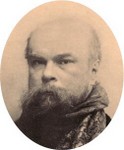 Let us conclude with a foreign poet, the French Paul Verlaine, who arrived in London in 1872, in the company of Arthur Rimbaud. A charcoal drawing by his friend F.A. Cazals portrays him immobile and melancholy in a street in London, with a policeman in the background. In the Sonnet Boiteux (meaning "lame sonnet"), written in 1873, he described the city as Babylon, a "city of the Bible", perpetually immersed in dirty yellow mist, where the houses seem as stiff as elderly ladies, and where the past manifests itself amid laments and whimpers which seem to come out of every corner. Throughout the long poem, the author tells us that each neighbourhood has its own peculiar character to it. Soho, for example, is an invitation to dance. The waters of Paddington, instead, paler than a dead woman, no longer bear reflections, and there is no hope that the Sun may shine above the darkened houses, barely lit by the gas lamps. Sunny weather does not suit London. The city has taken from him what was his favourite pastime, that of roaming aimlessly around the streets.
Let us conclude with a foreign poet, the French Paul Verlaine, who arrived in London in 1872, in the company of Arthur Rimbaud. A charcoal drawing by his friend F.A. Cazals portrays him immobile and melancholy in a street in London, with a policeman in the background. In the Sonnet Boiteux (meaning "lame sonnet"), written in 1873, he described the city as Babylon, a "city of the Bible", perpetually immersed in dirty yellow mist, where the houses seem as stiff as elderly ladies, and where the past manifests itself amid laments and whimpers which seem to come out of every corner. Throughout the long poem, the author tells us that each neighbourhood has its own peculiar character to it. Soho, for example, is an invitation to dance. The waters of Paddington, instead, paler than a dead woman, no longer bear reflections, and there is no hope that the Sun may shine above the darkened houses, barely lit by the gas lamps. Sunny weather does not suit London. The city has taken from him what was his favourite pastime, that of roaming aimlessly around the streets.